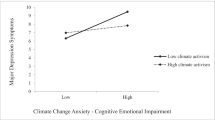Abstract
The negative effects of vicarious traumatic exposure are well known. However, less is known about potential positive changes following vicarious exposure. Respondents living in Britain (n = 108) were surveyed about their vicarious exposure to the terrorist attacks of September 11. They also completed measures of their perceptions of the events of September 11, and positive (valuing friends and family more) and negative changes (loss of meaning, greater anxiety). Results revealed that respondents who perceived the terrorist attacks to be an attack on their own values and beliefs, or the work of religious fanatics, were more likely to report positive changes. Negative and positive psychological changes were positively associated.
Similar content being viewed by others
References
Galea, S., Ahern, J., Resnick, H., Kilpatrick, D., Bucuvalas, M., Gold, J., et al. (2002). Psychological sequelae of the September 11 terrorist attacks in New York City. New England Journal of Medicine, 346, 982–987.
Janoff-Bulman, R. (1989). Assumptive worlds and the stress of traumatic events: Applications of the schema construct. Social Cognition, 7, 113–136.
Janoff-Bulman, R. (1992). Shattered assumptions: Toward a new psychology of trauma. New York: Free Press.
Joseph, S., Williams, R., & Yule, W. (1993). Changes in outlook following disaster: The preliminary development of a measure to assess positive and negative responses. Journal of Traumatic Stress, 6, 271–279.
Lipkus, I. M., Dalbert, C., & Siegler, I. C. (1996). The importance of distinguishing the belief in a just world for self versus others: Implications for psychological well-being. Personality and Social Psychology Bulletin, 22, 666–677.
Pearlman, L. A., & Mac Ian, P. S. (1995). Vicarious traumatization: An empirical study of the effects of trauma work on trauma therapists. Professional Psychology: Research and Practice, 26, 558–565.
Polatinsky, S., & Esprey, Y. (2000). An assessment of gender differences in the perception of benefit resulting from the loss of a child. Journal of Traumatic Stress, 13, 709–718.
Pyszczynski, T., Solomon, S., & Greenberg, J. (2002). In the wake of 9/11: The psychology of terror. Washington, DC: American Psychological Association.
Schlenger, W. E., Caddell, J. M., Ebert, L., Jordan, K., Rourke, K. M., Wilson, D., et al. (2002). Psychological reactions to terrorist attacks: Findings from the national study of Americans' reactions to September 11. JAMA, 288, 581–588.
Schuster, M. A., Stein, B. D., Jaycox, L. H., Collins, R. L., Marshall, G. N., Elliott, M. N., et al. (2001). A national survey of stress reactions after the September 11, 2001, terrorist attacks. New England Journal of Medicine, 345, 1507–1512.
Scruton, R. (2002). The West and the rest: Globalization and the terrorist threat. London: Continuum.
Tedeschi, R. G., & Calhoun, L. G. (1996). The Posttraumatic Growth Inventory: Measuring the positive legacy of trauma. Journal of Traumatic Stress, 9, 455–471.
Tedeschi, R. G., Park, C. L., & Calhoun, L. G. (1998). Posttraumatic growth: Conceptual issues. In R. G. Tedeschi, C. L. Park, & L. G. Calhoun (Eds.), Posttraumatic growth: Positive changes in the aftermath of crisis (pp. 1–22). Mahwah, NJ: Erlbaum.
Vlahov, D., Galea, S., Resnick, H., Ahern, J., Boscarino, J. A., Bucuvalas, M., et al. (2002). Increased use of cigarettes, alcohol, and marijuana among Manhattan, New York, residents after the September 11th terrorist attacks. American Journal of Epidemiology 155, 988–996.
Weiss, T. (2002). Posttraumatic growth in women with breast cancer and their husbands: An intersubjective validation study. Journal of Psychosocial Oncology, 20, 65–80.
Author information
Authors and Affiliations
Corresponding author
About this article
Cite this article
Linley, P.A., Joseph, S., Cooper, R. et al. Positive and Negative Changes Following Vicarious Exposure to the September 11 Terrorist Attacks. J Trauma Stress 16, 481–485 (2003). https://doi.org/10.1023/A:1025710528209
Issue Date:
DOI: https://doi.org/10.1023/A:1025710528209




